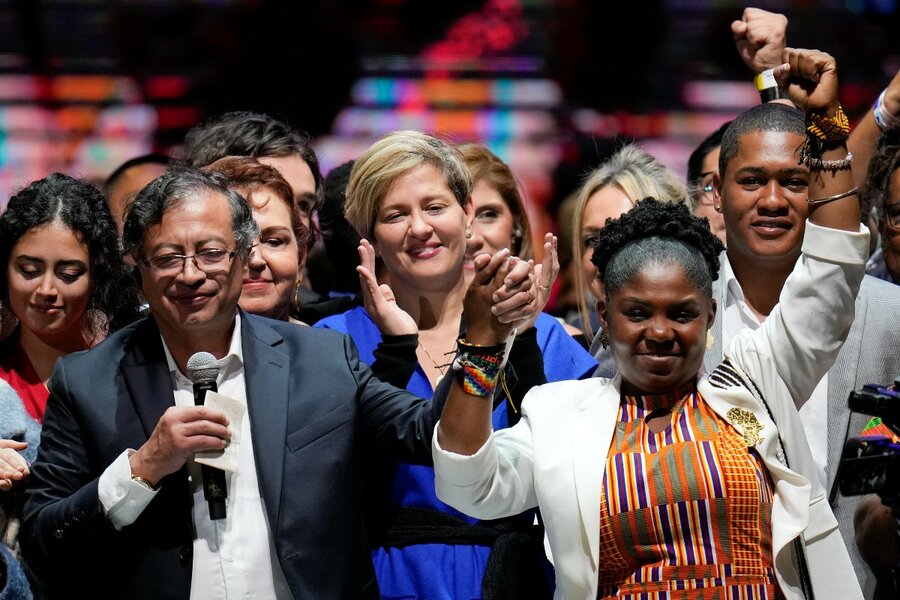Why Colombian voters picked their first leftist president
Loading...
| Bogota, Colombia
Colombia will be governed by a leftist president for the first time after former rebel Gustavo Petro narrowly defeated a real estate millionaire in a runoff election that underscored people’s disgust with the country’s traditional politicians.
Petro’s third attempt to win the presidency earned him 50.48% of the votes Sunday, while political outsider Rodolfo Hernández got 47.26%, according to results released by election authorities.
The election came as Colombians struggle with rising inequality, inflation and violence — factors that led voters in the election’s first round last month to punish long-governing centrist and right-leaning politicians and pick two outsiders for the runoff contest.
Petro’s win in Latin America’s third most populous nation was more than a defeat of Hernández. It puts an end to Colombia’s long stigmatization of the left for its perceived association with the country's half century of armed conflict. The president-elect was once a rebel with the now-defunct M-19 movement and was granted amnesty after being jailed for his involvement with the group.
Petro issued a call for unity during his victory speech Sunday night and extended an olive branch to some of his harshest critics, saying all members of the opposition will be welcomed at the presidential palace “to discuss the problems of Colombia.”
“From this government that is beginning there will never be political persecution or legal persecution, there will only be respect and dialogue,” he said, adding that he will listen to those who have raised arms as well as to “that silent majority of peasants, Indigenous people, women, youth.”
The vote is also resuling in Colombia having a Black woman as vice president for the first time. Petro’s running mate, Francia Márquez, 40, is a lawyer and environmental leader whose opposition to illegal mining resulted in threats and a grenade attack in 2019.
Hernández, whose campaign was based on an anti-corruption fight, conceded his defeat shortly after results were announced.
“I accept the result, as it should be, if we want our institutions to be firm,” he said in a video on social media. “I sincerely hope that this decision is beneficial for everyone.”
Petro’s showing was the latest leftist political victory in Latin America fueled by voters’ desire for change. Chile, Peru and Honduras elected leftist presidents in 2021, and in Brazil former President Luiz Inácio Lula da Silva is leading the polls for this year’s presidential election.
But the results were an immediate reason to fret for some voters whose closest reference to a leftist government is the troubled neighboring Venezuela.
“We hope that Mr. Gustavo Petro complies with what was said in his government plan, that he leads this country to greatness, which we need so much, and that (he) ends corruption,” said Karin Ardila García, a Hernández supporter in the north-central city of Bucaramanga. “That he does not lead to communism, to socialism, to a war where they continue to kill us in Colombia. ... (H)e does not lead us to another Venezuela, Cuba, Argentina, Chile.”
About 21.6 million of the 39 million eligible voters cast a ballot Sunday. Abstentionism has been above 40% in every presidential election since 1990.
Petro, 62, will be officially declared winner after a formal count that will take a few days. Historically, the preliminary results have coincided with the final ones.
Several heads of state congratulated Petro on Sunday. So did a fierce critic, former President Álvaro Uribe, who remains a central figure in Colombia’s politics.
Polls ahead of the runoff had indicated Petro and Hernández — both former mayors — were in a tight race since they topped four other candidates in the initial May 29 election. Neither got enough votes to win outright and headed into the runoff.
Petro won 40% of the votes in the initial round and Hernández 28%, but the difference quickly narrowed as Hernández began to attract so-called anti-Petrista voters.
Petro has proposed ambitious pension, tax, health and agricultural reforms and changes to how Colombia fights drug cartels and other armed groups. But he will have a tough time delivering on his promises as he does not have a majority in Congress, which is key to carrying out reforms.
“The people who do support him have very high hopes, and they are probably going to be disappointed pretty quickly when he can’t move things right away,” said Adam Isacson, an expert on Colombia at the Washington Office on Latin America think tank.
“I think you might find a situation where he either has to strike some deals and give up a lot of his programs just to get some things passed or the whole country could be gridlocked,” Isacson added.
Petro is willing to resume diplomatic relations with Venezuela, which were halted in 2019. He also wants to make changes to Colombia’s relations with the U.S. by seeking a renegotiation of a free trade agreement and new ways to fight drug trafficking.
U.S. Secretary of State Antony Blinken said in a statement that the Biden administration looks forward to working with Petro.
Polls say most Colombians believe the country is heading in the wrong direction and disapprove of President Iván Duque, who was not eligible to seek reelection. The pandemic set back the country’s anti-poverty efforts by at least a decade. Official figures show that 39% of Colombia’s lived on less than $89 a month last year.
The rejection of politics as usual “is a reflection of the fact that the people are fed up with the same people as always,” said Nataly Amezquita, a 26-year-old civil engineer waiting to vote. “We have to create greater social change. Many people in the country aren’t in the best condition.”
But even the two outsider candidates left her cold. She said she would cast a blank ballot: “I don’t like either of the two candidates. ... Neither of them seems like a good person to me.”
___
Garcia Cano reported from Caracas, Venezuela.







